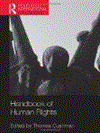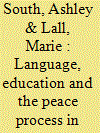|
|
|
Sort Order |
|
|
|
Items / Page
|
|
|
|
|
|
|
| Srl | Item |
| 1 |
ID:
129926


|
|
|
|
|
| Edition |
2nd ed.
|
| Publication |
Oxon, Routledge, 2012.
|
| Description |
xxiii, 744p.Hbk
|
| Standard Number |
9780415480239
|
|
|
|
|
|
|
|
|
|
|
|
Copies: C:1/I:0,R:1,Q:0
Circulation
| Accession# | Call# | Current Location | Status | Policy | Location |
| 057710 | 323/CUS 057710 | Main | On Shelf | Reference books | |
|
|
|
|
| 2 |
ID:
143897


|
|
|
|
|
| Summary/Abstract |
This article analyses the relationship between the politics of education and language, and armed conflict and ongoing peace process in Myanmar. It discusses the state education system, which since the military coup of 1962 has promoted the idea of the country based on the language and culture of the Bamar (Burman) majority community, and the school systems developed by ethnic armed groups which oppose the military government. Ethnic opposition education regimes have developed mother tongue-based school systems. In some cases, the Mon for example, these broadly follow the government curriculum, while being locally owned and delivered in ethnic languages; in others, such as the Karen, the local education system diverges significantly from the Myanmar government curriculum, making it difficult for students to transition between the two systems. This article explores the consequences of these developments, and how reforms in Myanmar since 2011 — including the peace process, which remains incomplete and contested — have opened the space for educational reform, and the possible “convergence” of state and non-state education regimes. Ethnic nationality communities remain determined to conserve and reproduce their own languages and cultures, adopting positions in relation to language and education which reflect broader state-society relations in Myanmar, and in particular ethnic politicians’ demands for a federal political settlement to decades of armed conflict. The article concludes that sustainable resolution to Myanmar’s protracted state-society conflict is unlikely to be achieved until elites can negotiate agreement on ethnic language and teaching policies.
|
|
|
|
|
|
|
|
|
|
|
|
|
|
|
|
| 3 |
ID:
114093


|
|
|
|
|
| Publication |
2012.
|
| Summary/Abstract |
When the Irish Free State was founded in 1922, the Irish language was a substantial feature of the politics that led up to this event. Subsequently the language was recognised as the national and first official language of the Irish Free State. Since then, the de jure position of Irish appears to have evolved. Most recently, legislation was introduced in the Republic of Ireland, and statutory duties were placed upon certain public bodies with regard to the Irish language in Northern Ireland. This article examines this historical shift in the status of Irish in the two political jurisdictions in Ireland, the Republic of Ireland and Northern Ireland [as a part of the United Kingdom of Great Britain and Northern Ireland (UK)], and explains its significance.
|
|
|
|
|
|
|
|
|
|
|
|
|
|
|
|
|
|
|
|
|